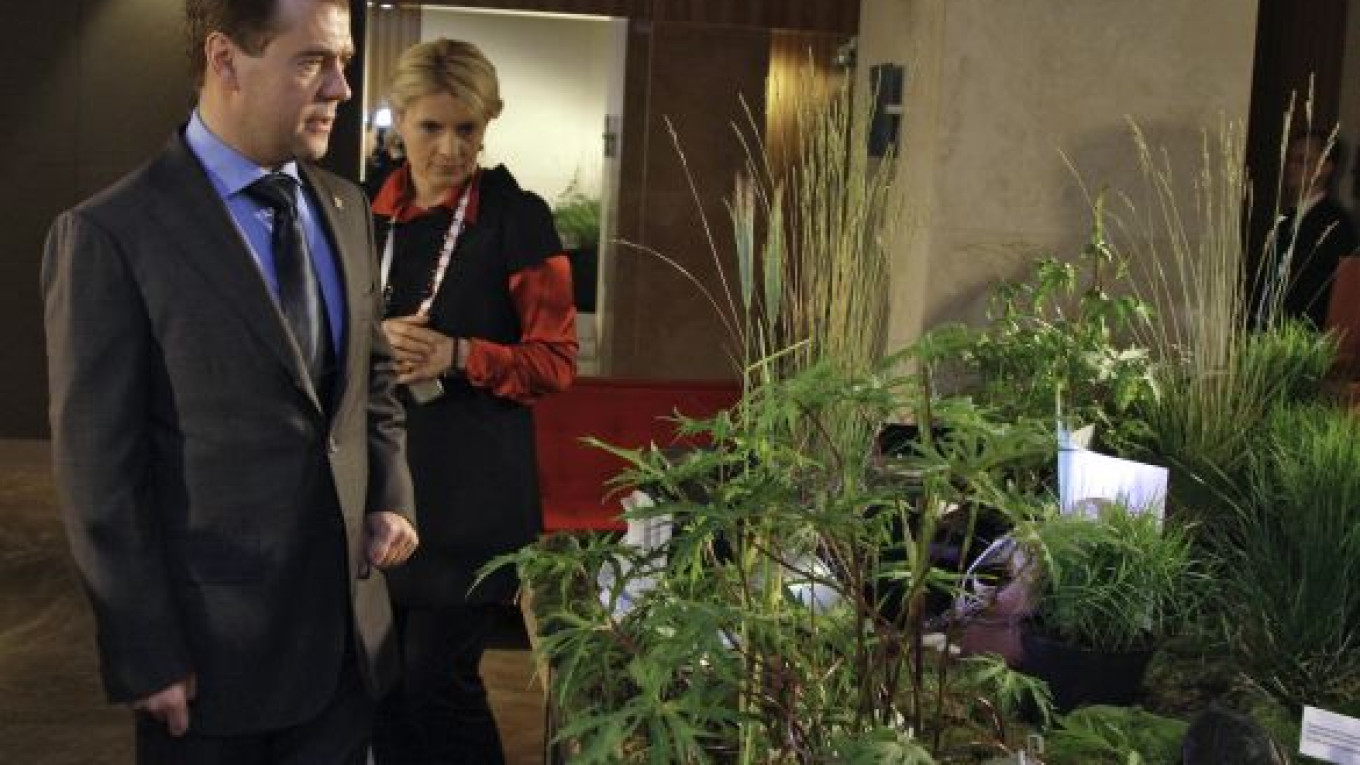President Dmitry Medvedev on Wednesday rolled out a global initiative to stem Afghan drug trafficking to include a comprehensive crackdown on opium poppy growing, but the United States gave a cool reception to the plan.
Russia, the world's largest per capita heroin consumer with an estimated 30,000 people dying of abuse annually, has tried to take the lead to combat a flow of drugs from Afghanistan.
Moscow believes that U.S.-led NATO forces fighting the Taliban in Afghanistan are reluctant to uproot local drug output, which has surged after their invasion in 2001 and now accounts for 90 percent of all heroin produced globally.
The United States said eradicating poppy plantations would push disgruntled Afghan farmers into the hands of insurgents.
Medvedev said the world community must work out a joint approach to combat Afghan drugs.
"We see drug addiction as significant, the most severe threat to the development of our country, to the health of our people," Medvedev told a forum on Afghan drug production.
Foreign Minister Sergei Lavrov called for a binding United Nations resolution on Afghan drugs.
"We are confident there is a need for the UN Security Council to call the Afghan drug threat as a threat to international peace and security," he said.
Viktor Ivanov, head of the Federal Drugs Control Service, said the adoption of such a resolution by the UN would create a legal basis for an international fight against Afghan drugs.
The plan drafted by Moscow envisages eradication of no less than 25 percent all those areas growing opium poppies, from which heroin is derived, up from last year's 3 percent.
Moscow also wants the destruction of poppy fields to form part of the remit of NATO forces operating in Afghanistan.
"We should act at least as decisively fighting drug production in Afghanistan as it is done when fighting cocaine production in South America," Lavrov said, referring to the effort that the U.S. puts into combating the cocaine trade.
Patrick Ward, acting deputy director for supply reduction at the White House Office of National Drug Control Policy, warned the forum of the dangers of pushing poor peasant farmers into the hands of the militants.
"This will further undermine the rule of law and reinforce the nexus between drugs and terrorism," he said.
In March, NATO rejected Russian calls for it to eradicate opium poppy fields in Afghanistan, saying it cannot be in a situation where it removes "the only source of income of people who live in the second poorest country of the world."
The Russian plan envisages job creation schemes.
NATO and Afghan forces conducted 56 anti-drug operations in the first three months of 2010, which led to the destruction of 16.3 metric tons of opium, Ward said.
Seventy metric tons of heroin worth $13 billion is consumed in Russia every year, according to UN estimates.
Any rift between Moscow and Washington over the drugs issue would not affect the transits of cargo for NATO troops in Afghanistan via Russia, Moscow's envoy to NATO, Dmitry Rogozin, said on the sidelines of the forum.
"We're interested in the transit ourselves, so that the coalition acts without disruptions," he said. "We're not going to shoot ourselves in the foot merely to spite them."
A Message from The Moscow Times:
Dear readers,
We are facing unprecedented challenges. Russia's Prosecutor General's Office has designated The Moscow Times as an "undesirable" organization, criminalizing our work and putting our staff at risk of prosecution. This follows our earlier unjust labeling as a "foreign agent."
These actions are direct attempts to silence independent journalism in Russia. The authorities claim our work "discredits the decisions of the Russian leadership." We see things differently: we strive to provide accurate, unbiased reporting on Russia.
We, the journalists of The Moscow Times, refuse to be silenced. But to continue our work, we need your help.
Your support, no matter how small, makes a world of difference. If you can, please support us monthly starting from just $2. It's quick to set up, and every contribution makes a significant impact.
By supporting The Moscow Times, you're defending open, independent journalism in the face of repression. Thank you for standing with us.
Remind me later.


